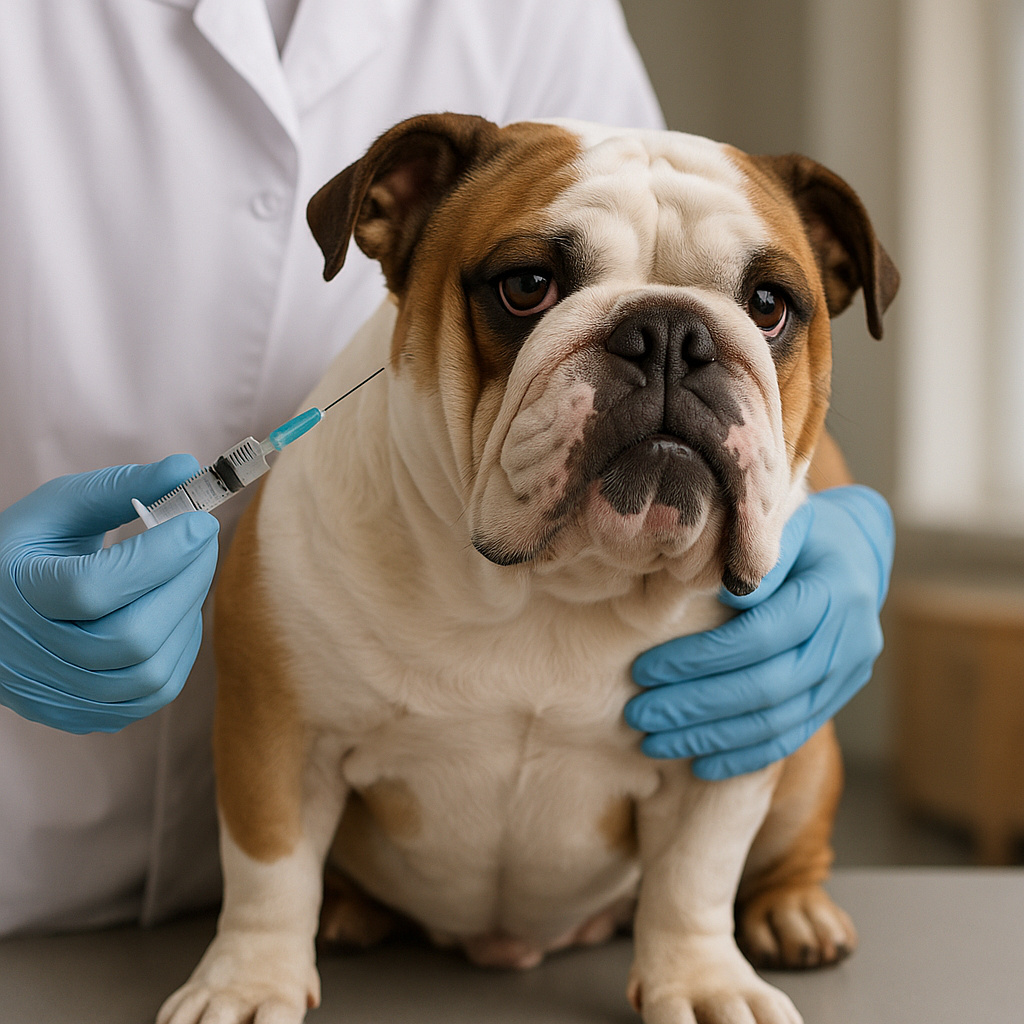Vaccinating a bulldog is not just a preventive measure; it’s a fundamental action to protect their health, well-being, and life. Vaccines strengthen the dog’s immune system against serious diseases, many of which are potentially fatal or highly contagious. In breeds like the bulldog, which have more delicate health and are predisposed to certain issues, keeping their vaccination schedule up to date is one of the most important responsibilities of a pet owner. Moreover, vaccination protects not only the vaccinated dog but also other animals and people by reducing the spread of viruses and bacteria.
There are two types of vaccines: mandatory or “core” vaccines, and optional or “non-core” vaccines. Core vaccines are those that every bulldog should receive without exception, regardless of their lifestyle, as they prevent severe diseases that can be easily transmitted. Non-core vaccines depend on the individual dog’s risk factors, such as their environment, travel habits, contact with other animals, and more.
One of the core vaccines is the one against canine distemper. This is a highly contagious viral disease that affects the respiratory, digestive, and nervous systems. It can cause fever, eye and nasal discharge, vomiting, seizures, and paralysis. It is especially dangerous in puppies and has a high mortality rate. Bulldogs are not exempt from risk and must receive this vaccine as part of their initial protocol.
Another essential vaccine is for canine parvovirus. This disease mainly attacks the digestive system and is extremely contagious, especially among unvaccinated puppies. Symptoms include severe vomiting, bloody diarrhea, dehydration, and lethargy. Treatment is expensive and doesn’t always guarantee recovery, so prevention through vaccination is crucial.
Also important is the vaccine against infectious canine hepatitis, caused by adenovirus type 1. Although less common today due to widespread vaccination, it can cause severe liver damage, fever, abdominal pain, and in some cases, death. This vaccine is usually included in combination shots like the well-known “triple” or “quad” vaccines.
Another core vaccine is for rabies, which is legally required in many countries. Rabies is a deadly disease that affects the nervous system and can be transmitted to humans through bites or contact with saliva. While the risk of infection has decreased in urban areas, it remains a legal requirement and a vital protection for both the animal and the people around them.
In addition to core vaccines, there are non-mandatory but highly recommended vaccines depending on the bulldog’s lifestyle. One of them is the vaccine against leptospirosis, a bacterial disease that can be transmitted to humans (zoonotic) and is contracted through contact with water or soil contaminated with the urine of infected animals. Symptoms include fever, vomiting, jaundice, and kidney or liver failure. If your bulldog lives in humid or rural areas, or frequently visits parks, this vaccine is highly recommended.
Another optional vaccine is for kennel cough (canine infectious tracheobronchitis), also known as bordetella. This disease spreads easily in places where dogs interact, such as dog daycares, kennels, parks, or grooming salons. While usually not serious, it can cause persistent coughing, sneezing, nasal discharge, and weakness. Some bulldogs, due to their respiratory structure, may develop complications, so this vaccine can be useful in their case.
There is also a vaccine for giardia, an intestinal parasite that can cause chronic diarrhea, weight loss, and general discomfort. Although not mandatory, some veterinarians recommend it in high-risk situations, especially if there are children at home or if the bulldog has a compromised immune system.
The vaccination schedule begins in puppyhood, generally between 6 and 8 weeks of age. Multiple doses are administered at intervals of 3 to 4 weeks, and the full series is completed between 16 and 20 weeks. After the initial series, the bulldog should receive annual or biennial boosters depending on the vaccine and the veterinarian’s recommendations.
It’s important not to vaccinate a sick dog or one with a compromised immune system, as their body may not respond properly. Vaccines should also be avoided in pregnant females unless indicated by a veterinarian. A general health check is always recommended before vaccination to ensure the bulldog is in optimal condition.
After vaccination, it’s normal for the bulldog to show mild side effects such as drowsiness, swelling at the injection site, loss of appetite, or low-grade fever. These symptoms usually disappear within a day or two. If more severe reactions occur, such as vomiting, difficulty breathing, facial swelling, or collapse, a vet should be consulted immediately as it may be an allergic reaction.
In summary, vaccines are an essential tool to protect your bulldog’s health against serious infectious diseases. Even if your dog stays indoors or doesn’t interact with other animals, the truth is that many viruses and bacteria are present in the environment and cannot be seen. Keeping the vaccination schedule up to date is a concrete way to care for your bulldog, prolong their life, and prevent unnecessary suffering. Always consult your trusted veterinarian to create a personalized vaccination plan tailored to your dog’s real needs.
